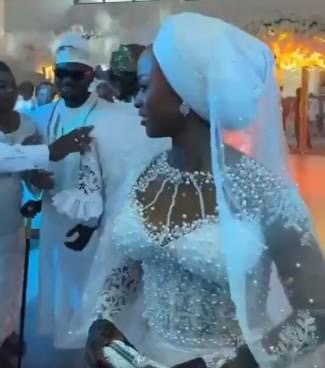Ghanaians from the Northern part of the country have explained a video clip of a wedding that had since gone viral on social media showing a lady interrupting the groom’s dance.
People from the region have clarified that it is actually a traditional practice in their culture.
The video, which went viral on Monday, May 27, showed a lady taking over the dance floor, keeping the groom to herself despite efforts to allow him to dance with his bride.
The bride, appearing calm, danced and smiled alone, as the lady had “taken possession” of the groom.
According to the groom, #Salmaanfaris1, this was not a scene of marital discord but a playful tradition known as “Da’chahili”.
He wrote: “It’s our culture … she’s my wife from my family.. before I marry another woman, I need to pay her.”
Another X User, #KDagbon, said: “No. The groom is our son, Salmaan. This is neither Islamic nor attributable to some side chick saga.”
“It’s a “Dagbanli” tradition known as “Da’chahili”. It’s all play. They are probably cousins. It’s also an opportunity for her to have made money, a lot of money”
#HelKoybut wrote: “They “wanted” her to stop, but they needed to pay her adequately. She didn’t go overboard, she played her part perfectly. The groom couldn’t get away that easily. His family and the bride also played their parts perfectly. To outsiders, it looked like a real scuffle was going on.”
#yaron_tamale clarified: “This is very common among we dagombas..traditionally, your female cousins are regarded as your wives and mostly, during your wedding they tend to do this just to let the woman know she is stealing their husband and this is nothing serious as you people are portraying it.”
Da’chahili is a traditional practice among the Dagomba people of Northern Ghana. It’s a lighthearted and playful custom where a female cousin or relative interrupts the groom’s dance during a wedding celebration.
This act symbolises the cousin’s playful “claim” on the groom, acknowledging their familial bond.
The groom’s family is expected to compensate the cousin with gifts or money, which is seen as a way of showing appreciation for their relationship.





















![#Edodecides2024: Obaseki calls for calm, hints at legal action [VIDEO]](https://thediscovererng.com/wp-content/uploads/2024/09/download-6-3-120x86.jpeg)






